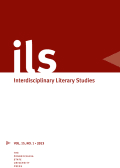
Interdisciplinary Literary Studies
Scope & Guideline
Redefining Literature Through Interdisciplinary Lenses
Introduction
Aims and Scopes
- Interdisciplinary Approaches to Literature:
The journal emphasizes the integration of various disciplines such as psychology, sociology, and cultural studies into literary analysis, fostering a rich dialogue between literature and other fields. - Exploration of Historical and Cultural Contexts:
It aims to contextualize literary works within their historical and cultural frameworks, examining how these elements influence narrative and thematic structures. - Focus on Marginalized Voices and Perspectives:
The publication highlights works that engage with feminist, postcolonial, and intersectional critiques, giving voice to underrepresented authors and themes. - Analysis of Contemporary Issues through Literature:
The journal frequently addresses contemporary societal issues, such as ecological crises, nationalism, and identity, showcasing literature as a medium for reflection and critique. - Innovative Literary Theory and Criticism:
It promotes new theoretical frameworks and critiques, including psychoanalysis, neurohumanities, and posthumanism, thus advancing literary scholarship.
Trending and Emerging
- Ecocriticism and Environmental Literature:
The increasing number of papers addressing ecological themes, such as the representation of disasters and nature's role in literature, indicates a growing concern for environmental issues within literary studies. - Feminist and Intersectional Critiques:
There is a significant rise in feminist literary analysis and intersectional approaches, reflecting a commitment to exploring gender, race, and class dynamics in literature. - Psychological and Neurocognitive Approaches:
Emerging themes in psychological and neurocognitive interpretations of literature highlight the journal’s interest in understanding the human mind and its interaction with literary texts. - Global and Transnational Perspectives:
An increasing focus on global literature and transnational narratives indicates a shift towards understanding literature in a broader, more interconnected context. - Comics and Graphic Narratives:
The journal is increasingly engaging with comics and graphic novels as legitimate literary forms, reflecting a trend towards visual narratives and their cultural significance.
Declining or Waning
- Traditional Literary Canon:
There appears to be a waning focus on traditional literary canons and classic texts, as the journal shifts towards contemporary and diverse narratives that challenge established norms. - Historical Literary Criticism:
The journal has gradually reduced its emphasis on historical literary criticism, suggesting a move away from purely historical analyses towards more interdisciplinary and thematic explorations. - Single Author Studies:
There is a noticeable decline in articles dedicated to the in-depth study of individual authors' works, reflecting a broader trend towards collective and comparative analyses instead.
Similar Journals
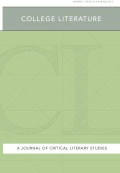
COLLEGE LITERATURE
Advancing Critical Perspectives in LiteratureCOLLEGE LITERATURE, published by the Johns Hopkins University Press, is a renowned journal dedicated to advancing the field of literary studies and education. With its ISSN 0093-3139 and E-ISSN 1542-4286, the journal spans a historic timeline from 2002 to 2024, highlighting its ongoing commitment to scholarly discourse. Although it operates under a traditional publishing model without open access provisions, it maintains a significant presence within academia, placing in Q3 in Literature and Literary Theory and Q4 in Education as of 2023. The journal ranks #277 out of 1106 in its category, reflecting its reputable standing in the 74th percentile within the Scopus database. With a strong focus on critical literary analysis and educational methodologies, COLLEGE LITERATURE serves as a vital resource for researchers, educators, and students seeking to deepen their understanding of literature's role in society. Its comprehensive approach ensures a broad spectrum of perspectives and insights, fostering a rich academic environment that engages and challenges its readership.
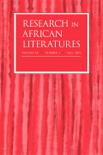
RESEARCH IN AFRICAN LITERATURES
Connecting Cultures through African Literary ScholarshipRESEARCH IN AFRICAN LITERATURES is a prestigious peer-reviewed journal published by Indiana University Press, dedicated to the critical exploration of African literary traditions, cultures, and texts. With an ISSN of 0034-5210 and an E-ISSN of 1527-2044, this journal stands out in the field of literature and literary theory, currently ranking in the 80th percentile of its category according to Scopus, making it a significant platform for scholars and researchers alike. Since its establishment, the journal has evolved through converged volumes from 2002 to 2024, consistently fostering innovative discourse and interdisciplinary approaches that illuminate the complexities of African narratives. Although it does not offer open access, the journal is integral for anyone engaged in African studies, providing critical insights that are essential for understanding the broader implications of literature within diverse cultural contexts. The journal's commitment to high standards of scholarship is reflected in its Q3 quartile ranking and its influential contribution to contemporary literary dialogue.

Concentric-Literary and Cultural Studies
Pushing Boundaries in the Study of Literature and CultureConcentric-Literary and Cultural Studies is a distinguished journal dedicated to advancing scholarship in the fields of literature and cultural studies. Published by the NATIONAL TAIWAN NORMAL UNIVERSITY, COLLEGE OF INTERNATIONAL STUDIES & SOCIAL SCIENCES, this journal offers a platform for researchers and academics to explore diverse topics that intersect literature and culture. With its ISSN 1729-6897 and E-ISSN 1729-8792, Concentric has been making significant contributions since its inception in 2012. Although presently listed in the Q4 quartile for both cultural studies and literature, the journal is committed to enhancing interdisciplinary dialogues and fostering innovative research approaches that push the boundaries of traditional scholarship. Residing in Taiwan, Concentric not only caters to local scholars but also reaches an international audience, providing access to critical perspectives and recent advancements in these pivotal fields. Aspiring to an impactful future, this journal continues to promote scholarly excellence and aims to ascend within academic rankings while engaging a robust community of researchers, professionals, and students.

ItinerArios-Revista de Literatura
Engaging Minds Through Literary ExplorationItinerArios-Revista de Literatura is a distinguished academic journal published by Universidade Estadual Paulista (UNESP), located in the vibrant city of Araraquara, Brazil. With a commitment to exploring the depths of literary analysis and theory, this journal serves as a crucial platform for scholars, researchers, and students to disseminate their work in the field of literature. Though the journal does not currently offer open access, it boasts a comprehensive focus on various literary traditions, critical interpretations, and emerging trends within the literary landscape. The ISSN for the print edition is 0103-815X, ensuring its recognition in the academic community. By providing a valuable forum for innovative research and engaging discussions, ItinerArios plays an essential role in enriching the discourse in the realm of literary studies, appealing to professionals and enthusiasts alike who are eager to contribute to and engage with contemporary literary scholarship.

Neo-Victorian Studies
Bridging Eras: Where Past Meets Present in ScholarshipNeo-Victorian Studies, published by Swansea University, is an esteemed interdisciplinary journal that delves into the vibrant cultural phenomena reflective of the Victorian era in contemporary contexts. Launched in 2008 as an Open Access platform, it invites scholars, researchers, and enthusiasts to explore the dynamic relationship between the past and present through critical discussions, innovative research insights, and theoretical frameworks. With a unique focus on the resurgence of Victorian themes and narratives in modern literature, arts, and media, this journal plays a pivotal role in advancing the understanding of neo-Victorianism within academia and beyond. Supported by a commitment to accessibility and scholarly excellence, *Neo-Victorian Studies* fosters an inclusive space for dialogue and discovery, making it an essential resource for those engaged in cultural studies, literature, and interdisciplinary research.

CHASQUI-REVISTA DE LITERATURA LATINOAMERICANA
Connecting Scholars to the Heart of Latin American StudiesCHASQUI-REVISTA DE LITERATURA LATINOAMERICANA is an esteemed academic journal published by Arizona State University, dedicated to the exploration and dissemination of research in the fields of Literature and Literary Theory and Cultural Studies. With an ISSN of 0145-8973 and an E-ISSN of 2327-4247, the journal serves as a critical platform for scholars examining the complexities of Latin American literature from diverse perspectives. Notably ranked in the second quartile in its field as of 2023, CHASQUI reflects its commitment to quality and impactful scholarship. The journal operates within a two-year converged publication cycle, ensuring it remains at the forefront of contemporary discussions and innovations in its disciplines. Although there are no open access options, researchers and students alike will find valuable insights within its pages, bolstered by a robust academic community. Through its dedication to fostering literary scholarship, CHASQUI plays an integral role in advancing the understanding of Latin American narratives and cultural expressions.

Novoe Literaturnoe Obozrenie
Unlocking the Depths of Literary Theory and CritiqueNovoe Literaturnoe Obozrenie, an esteemed publication dedicated to the realms of Cultural Studies and Literature and Literary Theory, serves as a vital resource for scholars and professionals alike. Published by NOVOE LITERATURNOE OBOZRENIE-NEW LITERARY OBSERVER in the Russian Federation, this journal provides critical insights and scholarly critiques that reflect the evolving landscape of literary discourse. With an established H-index and a focus on fostering academic inquiry, the journal has secured its place amidst contemporary scholarly discussions, indexed in Scopus with rankings that illustrate its commitment to quality despite a current presence in the lower quartiles. Novoe Literaturnoe Obozrenie is a non-open-access journal, encouraging a traditional yet scholarly approach to literary studies and remains an essential read for researchers, students, and professionals that seek to deepen their understanding of literature’s impact on culture and society. Publishing from 2016 until 2024, it continues to bridge theoretical frameworks with practical discourse, making significant contributions to the fields it encompasses.
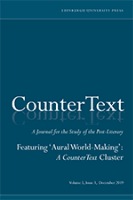
CounterText-A Journal for the Study of the Post-Literary
Challenging Traditions, Shaping FuturesCounterText: A Journal for the Study of the Post-Literary is a pioneering publication dedicated to exploring the intersections of literature and contemporary cultural discourse. Published by Edinburgh University Press, this journal provides a rich platform for academics and practitioners to engage with post-literary theory, fostering discussions that challenge traditional literary boundaries. With an impact factor reflecting its robust scholarly contribution, CounterText has achieved a notable Q3 ranking in the Literature and Literary Theory category, placing it within the top 30% of journals in its field according to Scopus metrics. Since its inception in 2015, the journal has aimed to provide innovative perspectives through rigorous peer-reviewed articles, essays, and critiques, allowing for a diverse range of voices within literary studies. Although currently not open access, CounterText remains an essential resource for researchers, students, and professionals interested in the evolving landscape of literature. Based in the United Kingdom, the journal continues to expand its global reach, underscoring its significance in fostering a comprehensive understanding of post-literary narratives and their cultural implications.
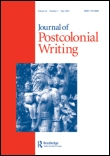
Journal of Postcolonial Writing
Unveiling Diverse Voices in Literary DiscourseJournal of Postcolonial Writing, published by ROUTLEDGE JOURNALS, TAYLOR & FRANCIS LTD, stands as a pivotal platform in the field of postcolonial studies and literary theory. Since its inception in 2005, this esteemed journal has cultivated a dedicated space for scholarly discourse, focusing on the complex interplay between literature, culture, and colonial histories. With an impressive Q1 ranking in the 2023 Literature and Literary Theory category and a notable Scopus rank of 97/1106, the journal occupies a vital place in the academic landscape, achieving a significant percentile of the 91st. Researchers and students alike will find the journal’s commitment to exploring diverse narratives and critical frameworks invaluable, making it an essential resource for those engaged in contemporary literary scholarship. Although not open access, readers can access high-quality research that contributes to meaningful conversations within the discipline, supporting the journal’s objective to foster interdisciplinary collaboration and innovation.
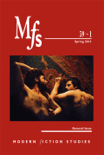
MFS-Modern Fiction Studies
Navigating the Landscape of Contemporary LiteratureMFS-Modern Fiction Studies is a premier journal in the field of literature and literary theory, published by Johns Hopkins University Press. With an impressive impact factor and a 2023 classification in Q1, this journal stands out as a vital resource for scholars, researchers, and practitioners interested in contemporary fiction analysis and criticism. The journal aims to foster innovative scholarship, enhance discussions around literary trends, and explore the intricacies of modern narrative forms. Notably, it ranks #119 among 1,106 in the Scopus Arts and Humanities category, placing it within the top 89th percentile. Published four times a year, MFS is committed to making significant contributions to the understanding of modern fiction, making it a must-read for anyone vested in the evolution of literature. Access options are available through institutional subscriptions, ensuring that readers can engage with cutting-edge research and discourse in the literary community.